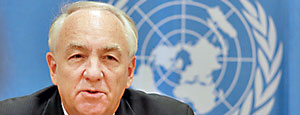Monday Feb 23, 2026
Monday Feb 23, 2026
Wednesday, 23 November 2016 01:10 - - {{hitsCtrl.values.hits}}
By Dharisha Bastians
Reporting from The Hague
Delaying the establishment of transitional justice mechanisms, including a special court to prosecute alleged war crimes, could be viewed as an attempt by the Government of Sri Lanka to “avoid” delivering on truth and justice for thousands of victims of the country’s civil war, a former top official in the US Government’s Office of Criminal Justice said. 
Former US Ambassador at Large for War Crimes Stephen J. Rapp told Daily FT on the sidelines of the Assembly of State Parties to the International Criminal Court now underway in The Hague, Netherlands, that there was no reason the Government of Sri Lanka could not begin setting up the office of the prosecutor and putting frameworks in place, even if the court would not get off the ground immediately.
“The Government could begin setting up those investigation units, a prosecutor’s office that could determine if there are cases and start putting cases together even if the court does not start work immediately,” said Ambassador Rapp, who also served as Prosecutor in the UN-backed Special Court of Sierra Leone that convicted former Liberian President Charles Taylor.
“Putting off the establishment of justice mechanisms could be an attempt to avoid it entirely,” he added.
In September 2015, Foreign Minister Mangala Samaraweera told the UN Human Rights Council in Geneva that his Government would set up a four-tier transitional justice system, including an Office for Missing Persons, a Truth and Reconciliation Commission, a Special Court to try grave crimes committed by both sides during the war, and a Reparations Office to deliver compensation to victims. The pledges were upheld in a UNHRC resolution adopted in October 2015.
The main reporting date on how far Sri Lanka has implemented the UNHRC 2015 resolution comes up in March 2017 in Geneva. So far, the Government has only managed to establish the Office of Missing Persons, and Minister Samaraweera has pleaded for patience from the international community as Sri Lanka “makes haste slowly” on delivering justice and reconciliation to its people.
Rapp hailed a decision by the Sri Lankan Government to remove a “firewall” of information initially contained in the draft legislation of the Office of Missing Persons that would have prevented information gathered during the search for the disappeared being used for prosecutions in the future.
“Removing that blockade was important because it is from truth-seeking that justice processes begin. The clamour for criminal justice springs from a truth-seeking process. It’s important for Sri Lanka to move from truth-seeking to delivering justice,” Ambassador Rapp told Daily FT. “That kind of block on information would effectively stop justice processes,” he added.
The former US Ambassador official said that while the incoming Trump administration may have a different focus when it pursues justice around the world, a core group of officials and diplomats within the Washington establishment would remain engaged on issues of accountability and reconciliation in Sri Lanka.
Rapp is known for having strongly supported the International Criminal Court (ICC) located in The Hague and international criminal tribunals and special courts during his tenure as US Ambassador for War Crimes issues.
In a meeting with journalists in The Hague this week, Ambassador Rapp, who remains a key figure in the international criminal justice system, expressed “regret” that the US was not a state party to the court.